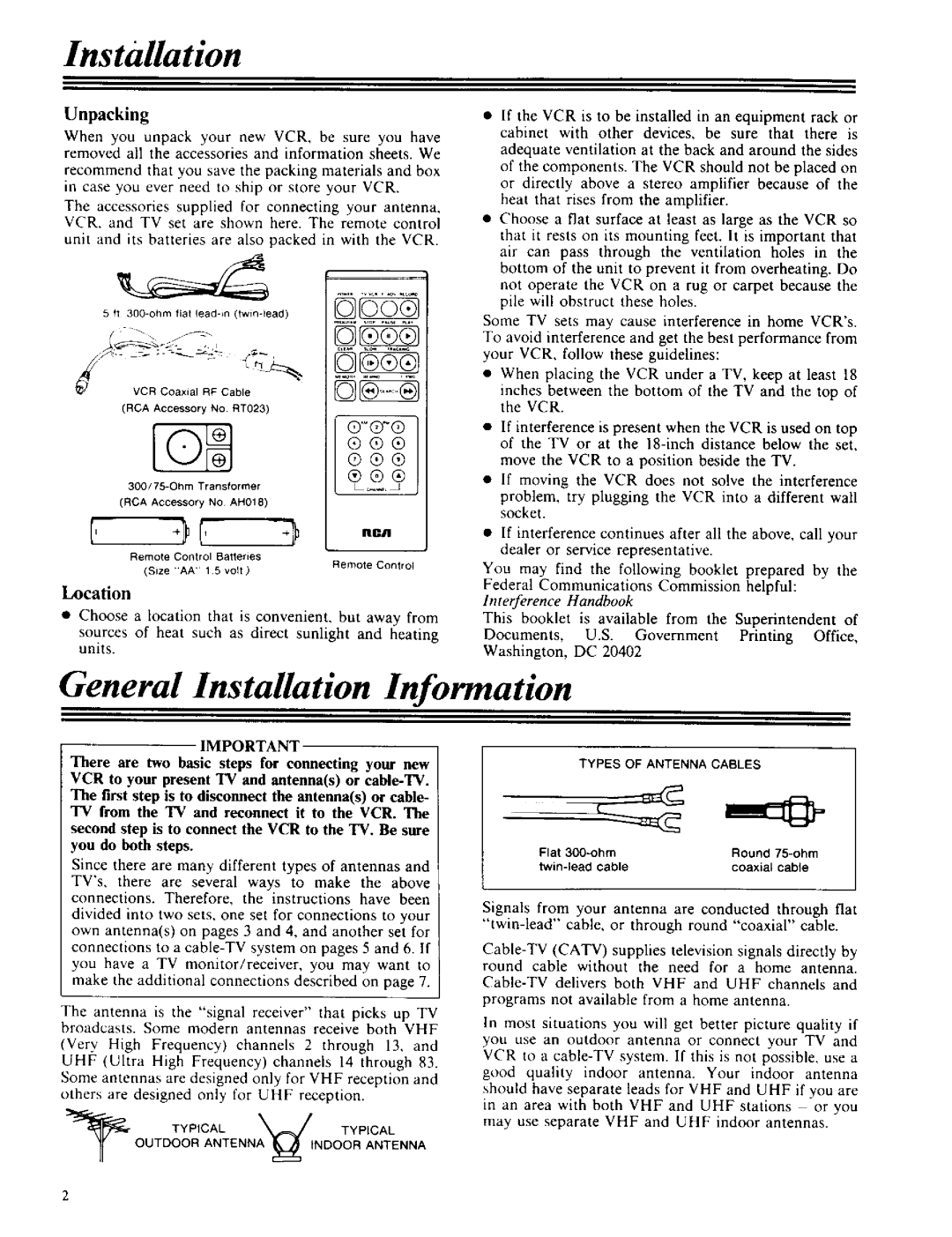
Installation
Unpacking
When you unpack your new VCR, be sure you have
removed all the accessories and information sheets. We
recommend that you save the packing materials and box
in case you ever need to ship or store your VCR.
The accessories supplied for connecting your antenna, VCR, and TV set are shown here. The remote control
unit and its batteries are also packed in with the VCR.
5 ft
_ | VCR Coaxial RF Cable |
(RCA Accessory NO RT023)
®®®
®®®
®®®
(RCA Accessory No AH018)
rlr_rl
Remote Control Batteries
•If the VCR is to be installed in an equipment rack or cabinet with other devices, be sure that there is adequate ventilation at the back and around the sides of the components. The VCR should not be placed on or directly above a stereo amplifier because of the heat that rises from the amplifier.
•Choose a flat surface at least as large as the VCR so that it rests on its mounting feet. It is important that air can pass through the ventilation holes in the bottom of the unit to prevent it from overheating. Do not operate the VCR on a rug or carpet because the pile will obstruct these holes.
Some TV sets may cause interference in home VCR's. To avoid interference and get the best performance from your VCR, follow these guidelines:
•When placing the VCR under a TV, keep at least 18
inches between the bottom of the TV and the top of the VCR.
•If interference is present when the VCR is used on top of the TV or at the
•If moving the VCR does not solve the interference
problem, try plugging the VCR into a different wall socket.
•If interference continues after all the above, call your dealer or service representative.
(Size "AA" 1 5 volt,)
Location
Remote Control
You may find the following booklet prepared by the
Federal Communications Commission helpful: Interference Handbook
•Choose a location that is convenient, but away from
sources of heat such as direct sunlight and heating units.
This booklet is available from the Superintendent of
Documents, U.S. Government Printing Office, Washington, DC 20402
General Installation Information
IMPORTANT
There are two basic steps for connecting your new VCR to your present TV and antenna(s) or
The first step is to disconnect the antenna(s) or cable- TV from the TV and reconnect it to the VCR. The second step is to connect the VCR to the 'IV. Be sure you do both steps.
Since there are many different types of antennas and
TV's, there are several ways to make the above connections. Therefore, the instructions have been
divided into two sets, one set for connections to your own antenna(s) on pages 3 and 4, and another set for connections to a
you have a TV monitor/receiver, you may want to make the additional connections described on page 7.
The antenna is the "signal receiver" that picks up TV broadcasts. Some modern antennas receive both VHF
(Very High Frequency) channels 2 through 13, and UHF (Ultra High Frequency) channels 14 through 83. Some antennas are designed only for VHF reception and others are designed only for UHF reception.
OUTDOOR | ANTENNA | _ | U | INDOOB ANTENNA |
TYPICAL |
| TYPLCAL | ||
TYPES OF ANTENNA CABLES
Flat | Bound |
coaxial cable |
Signals from your antenna are conducted through flat
In most situations you will get better picture quality if you use an outdoor antenna or connect your TV and VCR to a
in an area with both VHF and UHF stations or you may use separate VHF and UHF indoor antennas.
2
